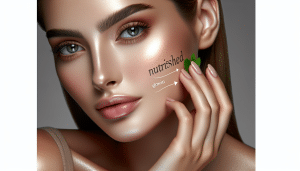Unlocking the Real Benefits of Collagen for Your Skin
Ella Knight October 27, 2025
Curious if collagen is the secret to healthier, more radiant skin? Dive into this practical guide to discover how collagen works, the science behind its beauty benefits, and what to consider when exploring skincare products or dietary choices focused on collagen support. See what research reveals and understand what’s truly possible.
Understanding Collagen and Its Role in Beauty
Collagen, often called the body’s structural protein, supports skin strength and elasticity. It forms a network in the dermis, acting as a natural cushion. This protein is found not only in skin but also in bones, muscles, and connective tissues. As time passes, the body’s collagen production gradually decreases. This is why people often notice fine lines or skin sagging as they age. The search for radiant, smooth skin leads many to explore options that can support collagen levels. Collagen’s reputation in beauty circles grows each year, with countless skincare and wellness products now claiming to boost or preserve it within the skin. But does collagen really deliver visible results, or is it just a buzzword?
Research suggests that supporting collagen can affect the appearance of skin in several ways. Its presence helps retain hydration, contributing to a plumper and more youthful look. Without adequate collagen, the skin may lose its ability to bounce back after expressions or physical pressure. The idea that certain ingredients or routines may promote collagen synthesis keeps gaining traction among consumers. Many daily skincare enthusiasts now gravitate toward products specifically labeled for their potential collagen benefits. Still, understanding what actually influences collagen is crucial before making decisions about beauty regimens or dietary habits.
Collagen isn’t just about looks—it plays a critical function in wound healing and skin barrier health as well. Its unique triple-helix structure gives tissue the flexibility and resilience needed to recover from minor damage. For people exploring anti-aging strategies, knowing how collagen contributes to both repair and appearance offers a more holistic approach. Compounds such as peptides and hyaluronic acid are often discussed together with collagen, since they also affect how the skin looks and feels. As excitement builds around these science-backed connections, people naturally want to learn more about how lifestyle can help maintain vibrant, healthy skin from within.
The Science Behind Collagen Supplements
Collagen supplements have become popular in the wellness community, often in the form of powders, capsules, or drinks. The idea is that consuming hydrolyzed collagen may support the body’s own production or help replenish what’s lost. Hydrolyzed collagen consists of small peptide chains, which are thought to be more easily digested and absorbed. Manufacturers claim that these peptides reach the skin and other tissues to help restore firmness. However, it’s important to examine scientific evidence rather than promises alone. Studies often focus on how the body processes these supplements and whether they can truly offer visible results in skin health or elasticity. Understanding this process is a key step.
Several clinical studies have explored oral collagen supplementation and its effects. Evidence suggests some participants may experience improvements in skin hydration, elasticity, and even wrinkle depth after consistent use for several months. These effects vary, depending on age, overall health, and other lifestyle factors. It’s noteworthy that not everyone may see dramatic differences. Individual responses often hinge on factors like diet, sun exposure habits, and baseline collagen synthesis. Insights from peer-reviewed studies help clarify which benefits appear most consistently and which remain less certain. The science isn’t settled, but curiosity continues to drive demand for collagen products.
One important consideration is regulatory oversight: supplements aren’t universally monitored for quality or effectiveness. This means not every product is created the same, and the potential for variation between brands is significant. There’s also debate around the bioavailability of these peptides—meaning how much actually reaches the skin after digestion. Experts recommend caution and careful review of labels before beginning any supplement routine. Some dermatologists advise opting for a balanced approach, combining topical skincare and dietary adjustments with any supplementation. Reviewing the evidence, along with medical guidance, helps consumers decide what’s genuinely worth considering in their pursuit of healthy, glowing skin.
Diet and Lifestyle Choices That Protect Collagen
The body’s natural ability to produce and safeguard collagen is influenced by more than age alone. Dietary choices play a significant role. Nutrients such as vitamin C, zinc, and copper are key players in the complex process that builds new collagen. Citrus fruits, berries, leafy greens, and seeds are all common in beauty-focused nutrition plans for this reason. Vitamin C, in particular, is essential for the synthesis of new collagen fibers. Without enough of it, the intricate assembly of new collagen is disrupted. This highlights the connection between a balanced, nutrient-rich diet and youthful-looking skin.
Beyond diet, outside factors can damage collagen or speed its breakdown. Prolonged sun exposure, smoking, high sugar intake, and chronic stress are all known contributors to collagen loss. Ultraviolet (UV) rays, in particular, break down collagen fibers at a deeper level. Protective habits such as using broad-spectrum sunscreen and minimizing excessive sugar in food choices can make a notable difference. Even regular, gentle movement—like yoga—supports circulation and skin nourishment. By understanding these risk factors, it becomes clearer why some age with fewer visible skin changes, while others notice effects much sooner.
A comprehensive beauty routine focuses not just on what’s added, but on supportive habits and prevention. Adequate sleep, staying hydrated, and managing emotional wellness all contribute to a stable environment for natural collagen production. Techniques such as facial massage are also gaining ground. They are believed to stimulate circulation, potentially encouraging the delivery of nutrients to the skin’s deeper layers. Small daily choices add up over time, underscoring why many experts now emphasize lifestyle and nutrition as a foundation for any beauty strategy involving collagen support.
Topical Skincare Options Related to Collagen
Many facial creams, masks, and serums on shelves claim to support or boost collagen in the skin. Key ingredients such as peptides, retinoids, and antioxidants are commonly featured. Peptides work as messengers, signaling the skin to produce more collagen or protect existing stores. Retinoids—vitamin A derivatives—are well-supported by research in their ability to stimulate cell turnover and collagen synthesis. When incorporated appropriately, they can help smooth fine lines, offering a more youthful appearance. Understanding what’s in these products, and why they matter, can help consumers navigate endless cosmetic choices.
Antioxidants in skincare, like vitamin C or E, can help defend collagen against environmental damage. Free radicals, produced by factors such as pollution or UV light, are known to degrade collagen over time. Skincare products targeted at neutralizing these effects therefore become valuable allies in a collagen-friendly routine. Serums or creams with stabilized vitamin C help prevent ongoing breakdown of this vital protein. For best results, consistent and correct use matters more than price or hype. Layering involves applying these actives in a particular order; thoughtful use ensures each ingredient supports the others and delivers benefits to the skin.
It’s important, however, to recognize the limits of topical options. Large collagen molecules in creams cannot penetrate the skin deeply enough to replace what’s lost in the dermis. Instead, the focus should often be on ingredients that signal the body to produce its own. Consulting with a dermatologist can help individuals develop an approach that combines effective skincare ingredients, realistic expectations, and attention to existing skin health. Attention to detail and evidence-based choices mean topical routines can become a powerful component of any collagen-supportive strategy—but not a substitute for the body’s own remarkable production process.
Frequently Asked Questions on Collagen and Beauty
Some of the most common questions include: Can collagen powder really change how skin looks? Is topical collagen effective, or just hype? How fast might someone expect results from a supplement or new skincare routine? The answers depend on individual factors as much as the product or regimen. Studies reveal modest benefits for some, especially among older adults with declining natural production. However, miracles are rare, and patience is vital for meaningful results (Source: https://www.ncbi.nlm.nih.gov/pmc/articles/PMC8824541/).
Another frequently discussed topic is safety. Collagen supplements are generally safe for most healthy individuals, but potential allergic reactions, digestive discomfort, or medication interactions may occur. Consulting a healthcare professional remains advisable before starting a new regimen. Reading ingredient labels and sourcing products from reputable companies also reduces risk. Media hype should not substitute for transparent information or guidance from trusted experts. Balanced knowledge is the foundation for good decisions in any beauty-focused journey.
Finally, advice from leading dermatologists highlights that collagen is just one piece of the skin health puzzle. Genetics, lifestyle, and other skincare choices have a significant influence on appearance. Progress tends to be subtle and requires ongoing commitment. Rather than fixating on any single nutrient or supplement, building a holistic routine often yields the most sustainable improvements. Exploring collagen science can inspire people to ask better questions and find options that fit their own needs and goals.
Weighing Expectations Against Reality
The appeal of collagen for enhancing beauty is easy to understand. Promising firmer, smoother, or more hydrated skin, it sparks hope for visible transformation. Yet, realistic expectations are essential. Evidence-based approaches reveal that no single product or dietary addition serves as a magic fix. Incremental improvements—especially over months of consistent effort—are more typical. Recognizing the influence of age, genetics, and external stressors fosters a more patient, satisfied relationship with beauty routines (Source: https://ods.od.nih.gov/factsheets/Collagen-Consumer/).
For those aiming to support their appearance with collagen, adopting an informed strategy pays off. This may include choosing nutrient-dense foods, managing habits that protect or restore collagen, and experimenting with skincare ingredients that have research backing. Skincare trends shift, but science-based guidance is a stable partner. Consumers are also encouraged to explore beyond superficial results—healthy skin reflects overall wellness, not just the promise of a single supplement or cream. Combining information from trusted resources with self-reflection about goals leads to a more rewarding path.
Ultimately, the world of collagen and beauty offers much to explore. From dietary innovation and supplement technology to preventive lifestyle habits and strategic skincare, the options continue to expand. By focusing on reliable evidence, balanced routines, and gradual changes, people seeking improved beauty outcomes can enjoy the journey—and perhaps experience real, lasting benefits. The story of collagen invites everyone to become an informed participant in their own wellness and beauty adventure.
References
1. Zague, V., de Freitas, V., da Costa Rosa, M., de Oliveira, N., & Navarro, R. (2018). Collagen peptides supplementation and skin health: A review. Retrieved from https://www.ncbi.nlm.nih.gov/pmc/articles/PMC6835901/
2. Proksch, E., Schunck, M., Zague, V., Segger, D., Degwert, J., Oesser, S. (2014). Oral intake of specific bioactive collagen peptides reduces skin wrinkles and increases dermal matrix synthesis. Retrieved from https://www.ncbi.nlm.nih.gov/pubmed/24401291
3. U.S. National Institutes of Health, Office of Dietary Supplements. Collagen Fact Sheet for Consumers. Retrieved from https://ods.od.nih.gov/factsheets/Collagen-Consumer/
4. American Academy of Dermatology Association. (n.d.). Nutrition and Your Skin. Retrieved from https://www.aad.org/public/everyday-care/nutrition/nutrition-your-skin
5. Linus Pauling Institute, Oregon State University. (n.d.). Vitamin C and Skin Health. Retrieved from https://lpi.oregonstate.edu/mic/health-disease/skin-health/vitamin-C
6. Choi, F. D., Juhasz, M. L. W., & Atanaskova Mesinkovska, N. (2019). Collagen Supplements for Aging and Wrinkles: A Paradigm Shift in the Fields of Dermatology and Cosmetics? Retrieved from https://www.ncbi.nlm.nih.gov/pmc/articles/PMC8824541/







